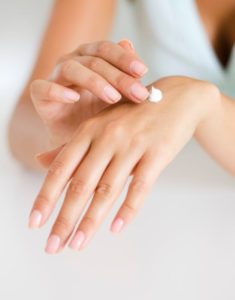Love the Skin You’re In
By: Jenna Hiester, Esthetician at United Artists Salon & Spa
 On your wellness journey, you probably think about ways to take care of your insides, but what are you doing to care for your body’s largest organ: your skin? Your skin is one of the most important players in your body’s first line of defense. Your immune system depends on your skin’s lipid barrier function to protect it from the outside environment. The lipids (oils) in the epidermis (outer) layer of the skin are often referred to as the “mortar” that holds together the corneocyte cells, or the “bricks.” This “brick wall” keeps water in the skin as well as keeps foreign invaders out. A weakened or damaged skin barrier function decreases the overall effectiveness of your immune system. As we age, our lipid production slows down, which is why we get drier skin as we get older. Skin that is dry, flaky, itchy, or sensitive is usually a sign of a depleted lipid supply. Sun exposure, poor diet, emotional and environmental stress, harsh products, pollution, and smog are also all damaging to our skin’s lipid barrier function. So what can we do to keep our armor in optimal health?
On your wellness journey, you probably think about ways to take care of your insides, but what are you doing to care for your body’s largest organ: your skin? Your skin is one of the most important players in your body’s first line of defense. Your immune system depends on your skin’s lipid barrier function to protect it from the outside environment. The lipids (oils) in the epidermis (outer) layer of the skin are often referred to as the “mortar” that holds together the corneocyte cells, or the “bricks.” This “brick wall” keeps water in the skin as well as keeps foreign invaders out. A weakened or damaged skin barrier function decreases the overall effectiveness of your immune system. As we age, our lipid production slows down, which is why we get drier skin as we get older. Skin that is dry, flaky, itchy, or sensitive is usually a sign of a depleted lipid supply. Sun exposure, poor diet, emotional and environmental stress, harsh products, pollution, and smog are also all damaging to our skin’s lipid barrier function. So what can we do to keep our armor in optimal health?
- Drink lots of water. All our organs benefit from sufficient water intake because water helps cells to function properly. Transepidermal water loss, or TEWL, is when water is evaporated from the skin’s surface, and is often a cause of dry, dull, and aging skin. Drinking water will help to counteract TEWL to keep your skin radiant and strong. Of course, a healthy and well-rounded diet will also help your skin’s cells to be at their best.
 The other key to keeping your skin hydrated is the use of a moisturizer. The skin needs both water and oils to operate properly, so even if you have oily skin, using a balancing moisturizer is important. When it comes to any type of body care, consistency is key! Get into a skincare routine by cleansing and then moisturizing both morning and night to take advantage of your skin’s circadian cycles. These two basic products are the fundamentals of topical skincare. A cleanser will remove excess oils and debris. An exfoliating cleanser will help to remove the build-up of corneocyte cells (“bricks”) that are ready to shed; just be sure not to over-exfoliate to the point of inflammation. When cleansing, use small circular motions to increase circulation to your skin to encourage cell turnover. Following up with a moisturizer will help to protect and nourish. During the day, make sure your moisturizer has an SPF; at night, a reparative moisturizer can help to reverse damage. Remember that your facial skin requires gentler products than the rest of your body.
The other key to keeping your skin hydrated is the use of a moisturizer. The skin needs both water and oils to operate properly, so even if you have oily skin, using a balancing moisturizer is important. When it comes to any type of body care, consistency is key! Get into a skincare routine by cleansing and then moisturizing both morning and night to take advantage of your skin’s circadian cycles. These two basic products are the fundamentals of topical skincare. A cleanser will remove excess oils and debris. An exfoliating cleanser will help to remove the build-up of corneocyte cells (“bricks”) that are ready to shed; just be sure not to over-exfoliate to the point of inflammation. When cleansing, use small circular motions to increase circulation to your skin to encourage cell turnover. Following up with a moisturizer will help to protect and nourish. During the day, make sure your moisturizer has an SPF; at night, a reparative moisturizer can help to reverse damage. Remember that your facial skin requires gentler products than the rest of your body.- Wear sunscreen. Although mentioned above, this is worth repeating. Sun damage is the number one cause of aging and weakened skin. According to the World Health Organization, an estimated 90% of skin aging is caused by photodamage. UV light causes changes to our skin’s DNA as well as the elastin, or fibers, in our skin. This causes sagging, wrinkles, hyperpigmentation (dark spots), hypopigmentation (white spots), and telangiectasias (dilated blood vessels), to name a few chronic issues. UV rays decrease the skin’s ability to recover from tears and bruises, significantly weakening our lipid barrier function and our immune system. UV radiation is also a carcinogen. According to the American Cancer Society, one in five Americans will develop skin cancer in their lifetime. The American Academy of Dermatology recommends that everyone should use a sunscreen that offers broad-spectrum protection with an SPF 30 or higher on a daily basis.
- The best place to start your skincare journey is to see a professional. Estheticians are state-licensed skincare therapists who can help to evaluate your skin’s needs to create a proper homecare regimen with products that are right for you. They can help to answer questions about your skin type and other concerns as well as perform regular skincare maintenance in a relaxing and therapeutic environment. They typically provide their services in salons, spas, medical spas, and dermatology practices. In taking care of our bodies, just behind primary prevention is early detection. A dermatologist is a medical practitioner qualified to diagnose and treat skin disorders. A yearly full-body scan will help to catch lesions and any irregular skin conditions for early treatment. Dermatologists can also perform more advanced skin care treatments.
If you follow these recommendations, your armor will be ready for battle! We only get one body, and a healthy lipid barrier function will help to protect it for the rest of your life. As an extra incentive, it’s important to note that another rewarding aspect of skincare is being able to physically see the benefits of your efforts; healthy skin is beautiful skin. So, love the skin you’re in!
Jenna has been a licensed esthetician since 2012 from West Reading. You can find her at United Artists Spa and Salon, where she offers a host of beauty and skincare treatments, including facials, facial and body waxing, eyelash aesthetics, and makeup applications and lessons.

 The other key to keeping your skin hydrated is the use of a moisturizer. The skin needs both water and oils to operate properly, so even if you have oily skin, using a balancing moisturizer is important. When it comes to any type of body care, consistency is key! Get into a skincare routine by cleansing and then moisturizing both morning and night to take advantage of your skin’s circadian cycles. These two basic products are the fundamentals of topical skincare. A cleanser will remove excess oils and debris. An exfoliating cleanser will help to remove the build-up of corneocyte cells (“bricks”) that are ready to shed; just be sure not to over-exfoliate to the point of inflammation. When cleansing, use small circular motions to increase circulation to your skin to encourage cell turnover. Following up with a moisturizer will help to protect and nourish. During the day, make sure your moisturizer has an SPF; at night, a reparative moisturizer can help to reverse damage. Remember that your facial skin requires gentler products than the rest of your body.
The other key to keeping your skin hydrated is the use of a moisturizer. The skin needs both water and oils to operate properly, so even if you have oily skin, using a balancing moisturizer is important. When it comes to any type of body care, consistency is key! Get into a skincare routine by cleansing and then moisturizing both morning and night to take advantage of your skin’s circadian cycles. These two basic products are the fundamentals of topical skincare. A cleanser will remove excess oils and debris. An exfoliating cleanser will help to remove the build-up of corneocyte cells (“bricks”) that are ready to shed; just be sure not to over-exfoliate to the point of inflammation. When cleansing, use small circular motions to increase circulation to your skin to encourage cell turnover. Following up with a moisturizer will help to protect and nourish. During the day, make sure your moisturizer has an SPF; at night, a reparative moisturizer can help to reverse damage. Remember that your facial skin requires gentler products than the rest of your body.

